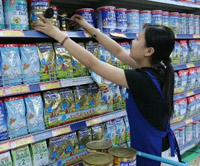
The Swiss food giant Nestle offered a public apology to Chinese consumers 9 days after information on substandard milk powder was revealed. But even with the public disclosure, buyers' confidence seems to be waning.
Chairman of Nestle China Josef Mueller made a public apology Sunday for its three-plus infant formula milk powder, which had higher iodine content than allowed by Chinese national standards.
"First of all, we will like to apologize to all our consumers for this unfortunate deviation from national standards with regarding to the iodine content. This happened in spite of our total commitment to comply with the national standards."
Nine days have passed since the test results on the batch of milk powder were released to the public. However, Nestle was aware of the high iodine content almost a month ago but took no action to stop sales for 20 days.
Sales of the substandard milk powder, mainly in Hangzhou, Shanghai and Guangzhou have stopped. Nestle China says customers can exchange the milk powder for a newer batch but can't return the items they have already bought.
The company producing the milk powder for Nestle is located in northeast China. Investigation reveals that the powder's different nutritional aspects don't have to be tested before being shipped. Zhao Aijun is in charge of Nestle's Quality Center in Tianjin.
"We made the mistake due to insufficient frequency of analysis. Immediate corrective actions have been taken by increasing frequency of Iodine testing in the final products."
Though an apology has finally been offered and the production process revealed, an online survey conducted last week by China's leading website Sina.com has shown that more than 80 percent of the over 36 thousand surveyed say they'll no longer consider buying Nestle's milk powder. Meanwhile, the company is holding promotional activities in major supermarkets in Beijing, trying to make up for its losses by offering discounts.
According to the national safety standards, every 100 grams of milk powder for infants and young children can contain 150 micrograms of iodine at most. But the surveyed milk powder was found to contain more than 190 micrograms. However the packages of the substandard milk powder tell that the product adheres to China's national standards.
(CRI June 6, 2005)
|

